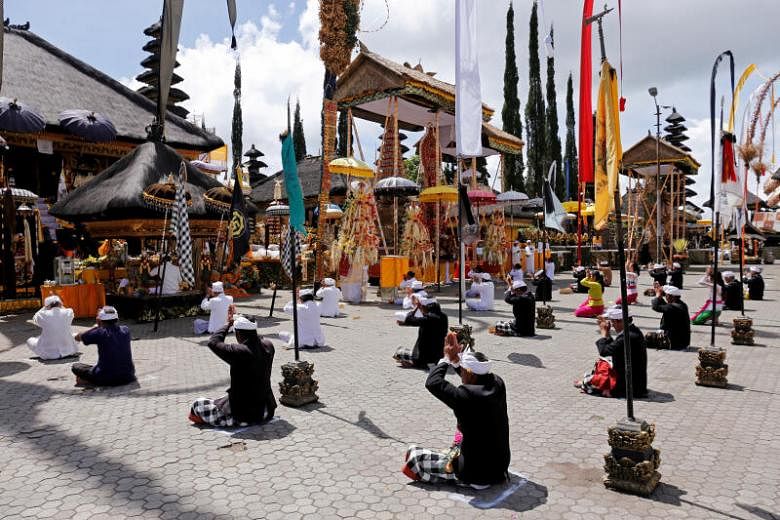JAKARTA - Indonesia's tourism hot spot Bali island will reopen to domestic tourists on Friday (July 31), but under a host of strict protocols that include visitors showing proof they tested negative for Covid-19.
The announcement comes as the province tries to revive its badly hit economy even as there is a continuing rise in new infections.
Mr I. Putu Astawa, head of Bali's tourism agency, told The Straits Times that care has been taken as the province seeks to strike a balance between its economic and health interests.
"The most important thing is to prevent the reopening from creating a new epicentre of transmission so this is a very tough decision to make," he said.
He added that the situation on the island is "under control", citing the recovery rate of around 75 per cent among Covid-19 patients.
On Wednesday (July 29), the province saw 61 fresh cases, bringing total infections to 3,310, with the number of deaths remaining at 48 since July 23.
Apart from needing to present antibody test results showing no Covid-19 infection, visitors will also have to observe "strict health protocols" such as safe distancing, temperature-taking and mask wearing.
Mr Putu said tourism sites must operate at below full capacity and its workers may have to put on additional protective equipment such as face shields and gloves.
The occupancy rate of hotels in Bali nosedived to 2.07 per cent in May, from 51.56 per cent in the same month last year and 62.55 per cent in December before the outbreak.
The resort island, which closed tourism sites in late March, has gradually reopened its tourism sites since July 9 for Bali residents.
It has set a goal of welcoming international tourists on Sept 11, but Mr Putu said this is still "subject to approval from the national government".
Experts have criticised the move by Indonesia, the world's fourth-most populous nation of nearly 270 million people, to ease social restrictions, including reopening tourism sites, across the vast archipelago. They said the premature lifting of a partial lockdown in some regions last month had already caused cases to climb and predict that this will last until at least September without stronger intervention.
Nationwide, the overall number of cases totalled 104,432, while deaths reached 4,975 as of Wednesday. Both figures are the highest in South-east Asia.
Dr I. Wayan Gede Artawan Eka Putra, an epidemiologist at Bali-based Udayana University, said while he saw no issue with reopening the island for tourism as long as strict measures are taken, the province's reliance on antibody tests is problematic.
Accurate detection of Covid-19 can only be achieved with polymerase chain reaction tests, he said.
He added that testing in Bali should be increased significantly, as it is now only half the World Health Organisation's benchmark of one test per 1,000 people each week.
Dr I Gusti Agung Ngurah Anom, chairman of the Bali chapter of the Indonesian Hospital Association, said hospitals will be able to cope with any spike in infections after the reopening.
"We are prepared," he said, adding that Bali will soon have additional 17 isolation beds to add to the 550 beds at 15 hospitals for Covid-19 patients.
Tourism-related businesses welcomed the move to reopen Bali for local tourists, saying they are ready to comply with the health protocols.
Mr Hariyadi Sukamdani, chairman of Indonesian Hotel and Restaurant Association, said that hotels and restaurants in Bali will ensure that they adhere to protocols such as maintaining a distance of at least 1m between customers and having staff wear masks and gloves when serving guests.
"There will be no compromise in implementing the health protocols. It's a must," he said. "If we are disciplined, we can control the transmission."
He added that the hotels and restaurants have coordinated with the health agency and hospitals to take quick action if any guests display Covid-19 symptoms.
Mr I. Ketut Ardana, chairman of the Bali chapter of the Indonesian Tour and Travel Agency Association, said that based on his assessment so far, Balinese visitors and operators of tourism sites have been observing the health guidelines.
"It's not a difficult thing for business players in Bali as we are used to prioritising cleanliness, health and safety. We only need to reinforce them further," he said.
Apart from Bali, Banyuwangi, a laid-back town in East Java, Indonesia's new epicentre of infections, began to open its doors for domestic tourism on Wednesday, hosting several meetings held by ministries and government institutions.












